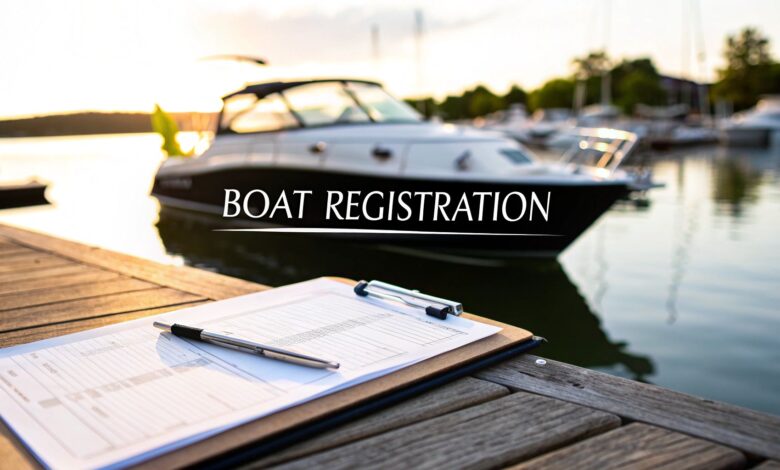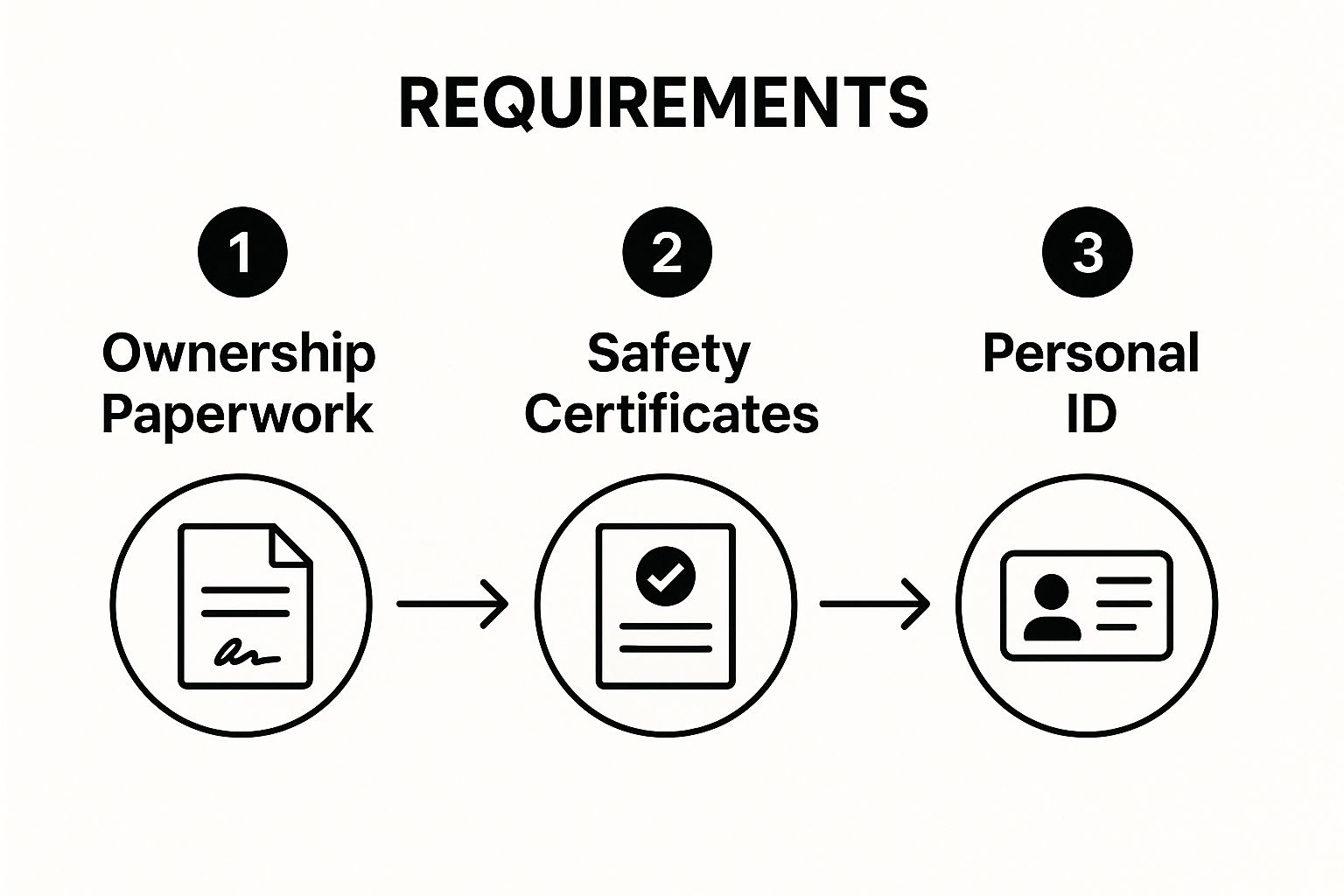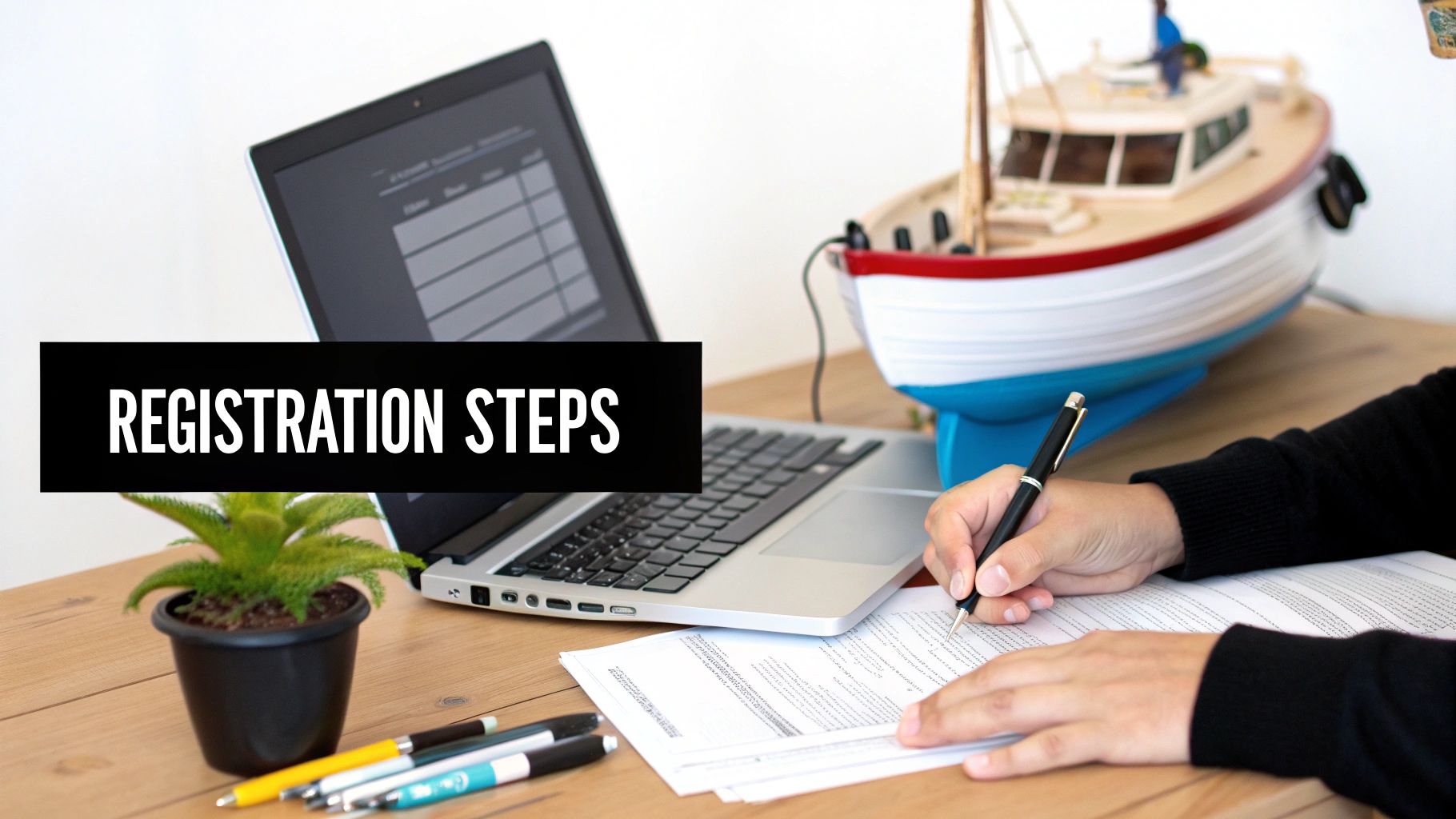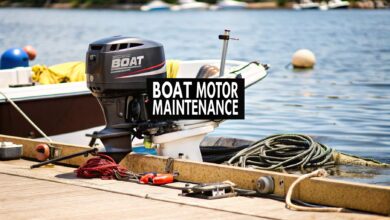
To get your boat legally on the water, you'll need to submit an application to your state's designated agency—usually the DMV or Department of Natural Resources (DNR). This involves providing proof that you actually own the vessel, typically with a Bill of Sale or a Manufacturer's Certificate of Origin. Think of it as the final step that makes your ownership official, giving you legal protection and the right to operate on public waterways.
Why You Absolutely Can't Skip Boat Registration
It's tempting to think you can dodge the paperwork and save a few bucks by not registering your boat. I've seen people try it, and believe me, it’s a mistake that can end up costing you a whole lot more in the long run. This isn't just some bureaucratic hoop to jump through; it's the bedrock of responsible boat ownership.
Let me paint you a picture I’ve seen play out before. You find a great deal on a used boat, pay cash, and seal the deal with a handshake. A few months later, it vanishes from the marina. Without official registration in your name, trying to prove to the police—or worse, your insurance company—that you're the rightful owner turns into a nightmare. Registration creates that undeniable, government-recognized paper trail that protects you.
It’s About More Than Just Following the Rules
Beyond proving you own the boat, the registration system serves a much bigger purpose that benefits the entire boating community. State and federal agencies rely on this data to track vessels and enforce safety standards. It’s how they know who is on the water, which becomes incredibly important during an emergency, a search and rescue mission, or an accident.
Those registration fees you pay aren't just disappearing into a void, either. They're often funneled directly back into maintaining the waterways and infrastructure we all depend on. This includes things like:
- Upkeeping public boat ramps and docks.
- Funding critical conservation efforts for fish and wildlife habitats.
- Supporting boating safety courses and law enforcement patrols.
The takeaway here is simple: registration plugs you and your boat into a larger system of safety, accountability, and resource management. Trying to sidestep it means you're not only risking fines but also failing to contribute to the health of the very waterways you love to use.
What Happens If You Get Caught?
Operating an unregistered boat is something law enforcement takes seriously. If you're stopped by the U.S. Coast Guard or a local marine patrol, you could be looking at anything from a steep fine to having your boat impounded on the spot. Either way, your day on the water is over. An unregistered boat can also create a massive headache with your insurance provider, who might just deny a claim for theft or damage if the vessel isn't legally on the books.
This formal process is only getting more important. The global boat market, valued at USD 44.09 billion in 2024, is expected to nearly double by 2033. As more boats hit the water, proper registration becomes even more critical for keeping things safe and organized for everyone. You can explore more about this trend and its impact on the boating industry to see why the regulations are tightening.
What Paperwork Do You Need to Register a Boat?

There's nothing more frustrating than showing up at the DMV or your local DNR office only to be turned away because you're missing a single piece of paper. To get your boat registered without a headache, you need to have all your documents lined up and ready to go before you even think about heading out the door.
Think of this paperwork as your boat’s official story. Every form and signature tells a piece of its history, from the day it left the factory to the moment you took ownership. The state needs this complete history to legally issue you a title and registration.
The Foundation: Proving You Own the Boat
Whether your boat is brand new or has seen a few seasons, some documents are simply non-negotiable. The absolute cornerstone of your application is proving that you are the rightful owner. Without it, you’re dead in the water.
This proof of ownership typically comes in one of two forms, and which one you need depends entirely on the boat's history.
-
For a new boat, the golden ticket is the Manufacturer's Certificate of Origin (MCO). Sometimes called a Manufacturer's Statement of Origin (MSO), this is basically the vessel's birth certificate from the builder. It proves the boat has never been titled before.
-
For a used boat, you need the previous owner’s official title, properly signed over to you. I can't stress this enough: check the title carefully for any outstanding liens. If a previous lender's claim hasn't been cleared, it can bring the entire ownership transfer to a screeching halt.
A common pitfall is thinking a Bill of Sale is enough for a used boat that should have a title. While a Bill of Sale is a crucial part of the process, most states require the official, state-issued title for boats over a certain size. The Bill of Sale is a supporting document, not a replacement.
Backing It Up: The Bill of Sale and Tax Info
After establishing ownership, the next step is proving the financial side of the transaction. The state needs this mainly to calculate and collect sales or use tax on the purchase.
This is where the Bill of Sale comes in. A proper Bill of Sale is more than just a handwritten receipt. It needs to be a detailed record of the transaction. Make sure it includes:
- Full names and addresses for both you (the buyer) and the seller.
- The final purchase price.
- A thorough description of the boat, including its Hull Identification Number (HIN), make, model, and year.
- The date the sale took place.
Both you and the seller need to sign it. Using a formal Bill of Sale template is always a good idea to make sure you don't miss any critical details.
If you bought from a dealer, they should provide a detailed invoice that clearly shows sales tax was collected. Hold onto that. Without it, the state will assume tax is due and send you the bill.
This paperwork might seem like a bureaucratic formality, but it’s actually tied to the health of the entire marine industry. New boat registrations are a key economic indicator. For example, recent data showed that new U.S. powerboat registrations fell by 8.1% over a 12-month period, a dip largely blamed on high interest rates. You can learn more about how these registration numbers reflect the boating market.
Finally, don't forget the little things. Some states might ask for a pencil tracing of the HIN or even photos of the boat. And remember, complex boats have complex systems—if you're weighing different power needs, our guide on how to pick a marine generator can be a big help. The best advice? Always check your state agency’s website for their specific checklist before you submit anything.
Actually Getting Your Boat Registered
Alright, with your documents sorted, you're ready for the main event: actually registering the boat. This is the part that makes it all official, but it can feel like a bureaucratic headache if you're not prepared. Let's walk through it so you can get on the water without any fuss.
First things first, you need to find out who handles boat registrations in your state. It's not the same everywhere, which catches a lot of people off guard. In California, for example, you're dealing with the DMV. Head over to Minnesota, and it's the Department of Natural Resources (DNR). Down in Florida, the Fish and Wildlife Conservation Commission (FWC) is in charge. The easiest way to figure this out is a quick search for "[Your State] boat registration." That'll point you to the right agency's website.
Filling Out The Application
Once you've located the right office, you'll find the main application form. This is where you'll plug in all the details from the paperwork you’ve gathered. It’s pretty straightforward, but you need to be precise.
You'll be asked for things like:
- Vessel Details: This is the boat's bio—its Hull Identification Number (HIN), make, model, year, length, and what it's made of (fiberglass, aluminum, etc.).
- Engine Info: They'll want to know the propulsion type (inboard or outboard), fuel (gas or diesel), and horsepower. This stuff matters for regulations and sometimes even the fee.
- Ownership Trail: You’ll need to list the seller's info exactly as it appears on the Bill of Sale or MCO.
My best advice here? Take your time. A single typo in the HIN or a mismatched purchase date can get your application bounced right back to you. It feels tedious, I know, but double-checking everything now will save you a world of frustration later.

Think of it like this image shows: your ownership papers, safety info, and personal ID are the three legs of the stool. If one is shaky, the whole thing falls apart. Everything needs to be in order before you submit.
What's This Going to Cost?
The next question is always about the fees. This isn't a simple, flat rate; the cost of registering a boat varies a lot depending on your state and, more importantly, your boat.
For instance, a 20-foot pontoon boat in Florida might run you about $50-$70 a year. Meanwhile, that same 16-foot fishing boat up in Minnesota could be as low as $25 for a three-year registration.
Most states base their fees on the boat's length—the longer the boat, the higher the fee. And don't forget about sales tax. If you didn't pay it at the time of purchase, you'll almost certainly have to pay it now.
Pro Tip: Before you mail anything or head to the office, check the agency's website for a fee calculator. These tools are incredibly helpful for getting an exact number. The most common reason for a delay is sending in the wrong amount.
Displaying Your New Numbers and Decals
Once your application is approved and the fees are paid, you'll get a packet in the mail with your registration certificate, a set of numbers, and validation decals. You're almost there, but the final step is displaying them correctly.
The registration numbers, which you’ll often hear called "bow numbers," have to be placed on both sides of the front half of your boat. The rules here are very specific, and marine patrol will definitely check.
- They must be applied as a decal or painted on.
- The characters need to be block-style and at least three inches high.
- Choose a color that contrasts sharply with your hull so they’re easy to read.
- The sequence must read left to right, with a clear space or a hyphen between the letter and number groups (like FL 1234 AB).
The validation decal, which shows the expiration year, usually goes a few inches away from the registration numbers. Getting this display right is just as important as the registration itself. And speaking of keeping things in order, don't forget the heart of your vessel. For some great tips on engine care, check out our guide to essential boat motor maintenance to keep you running smoothly all season.
Special Cases in Boat Registration

Not every boat purchase fits neatly into the "new from a dealer" or "used from a private seller" box. Sometimes, you run into situations that require a few extra steps. These aren't necessarily roadblocks, just different paths to getting your boat legally on the water.
Whether you've proudly built a boat with your own two hands or are navigating the complexities of a superyacht, understanding these unique registration scenarios will save you a world of headaches.
Registering a Homemade Boat
Building your own boat is an incredible accomplishment, but it also means you have a vessel without a factory-issued Hull Identification Number (HIN). A HIN is the boat's 12-character "VIN," and it's absolutely mandatory for registration.
So, how do you get one? You'll need to apply for a state-assigned HIN. This process is all about proving the boat is yours and that it's safe. Expect to:
- Fill out a specific application for homemade or "kit" boats.
- Dig up receipts for the major materials (lumber, fiberglass, engine, etc.) to prove ownership and establish the boat's value.
- Take photos of the finished boat from several angles—bow, stern, and both sides.
After you submit everything, the state will schedule an inspection. An official will come out to look over your work, check for seaworthiness, and ensure it meets basic safety requirements. Once you pass, they will physically attach the official HIN plate to your hull, giving your boat its permanent identity for all future titling and registration.
The World of High-Value Vessels
When you get into the realm of superyachts, registration becomes a different ballgame. It's less about the local DMV and more about complex legal and financial strategy. While you can title a large yacht at the state level, most owners choose to "flag" their vessel internationally by registering it in a foreign country.
Superyacht registration is a specialized field that often has more to do with international maritime law and tax planning than with local boating rules. The choice of flag can impact everything from crew regulations to operational privacy.
This is why certain countries have become global powerhouses for yacht registration. For example, the Cayman Islands registry is the undisputed leader, holding a massive 54% of the world's superyachts. Owners flock there for the favorable tax environment and respected maritime authority. Other major players include Malta (9%) and the Marshall Islands (8%). To get a better sense of these global dynamics, you can learn more about superyacht registration trends and why owners choose one flag over another.
Transferring an Out-of-State Registration
Bringing a boat from another state—either one you just bought or one you're moving with—requires you to re-register it in your new home state. Think of it just like getting new license plates for your car after a move.
You can't just keep using the old registration forever. Most states give you a grace period, usually 60 to 90 days, to get the paperwork switched over. You'll have to surrender the out-of-state title and registration documents to your new state's boating agency. In return, they'll issue a new title and a new set of registration numbers for you to display on your hull.
One heads-up: be prepared to address sales tax. If you can't prove you paid sales tax in the state you're coming from, your new state will likely charge you a "use tax" on the boat's value.
It's Registered! Now What? Staying Legal on the Water
Getting that registration certificate in your hand feels like a huge win, but your job isn't quite done. Think of your registration less like a one-and-done task and more like a living part of your boat's identity that needs a little attention to stay current.
First things first, you're legally required to have that registration certificate on board whenever you're using the boat. It's no different than carrying your driver's license in your wallet. If you're stopped by the Coast Guard or local marine patrol, it's one of the first documents they'll ask for.
Don't Let Your Registration Lapse
Boat registrations aren't forever. Depending on your state, you'll need to renew it every year or perhaps every two to three years. The good news? This is way easier than the initial application. You should get a renewal notice in the mail or by email about a month or two before it's due.
Whatever you do, don't toss that notice in a junk pile. If you miss the deadline, your boat is effectively unregistered, and you could face the same hefty fines as if you never registered it at all. Keep a close eye on the expiration date printed on your hull decals—they're your most visible reminder.
My Two Cents: I always set a recurring calendar reminder on my phone for one month before my registration expires. It’s a simple trick that gives me plenty of breathing room to get the renewal done without scrambling at the last minute and potentially missing the first perfect boating weekend of the season.
Life happens, and your registration details need to keep up. If you move, you have to let the boating agency know your new address. The same goes for any major changes to your boat, like swapping out the engine for a more powerful one. This isn't just bureaucratic red tape; it's crucial information for law enforcement and emergency services.
Your Annual Pre-Launch Checklist
The easiest way I've found to never forget this stuff is to build it right into my annual spring commissioning routine. While you're de-winterizing your boat and getting it ready for the water, run through this quick legal check-up.
- Renew First: Is your registration up for renewal this year? Get it done before you do anything else.
- Check Your Papers: Is the original registration certificate still in good shape and stored in a dry bag somewhere safe on the boat?
- Inspect Your Decals: Take a walk around the hull. Are the registration numbers and state decals still stuck on tight and easy to read? Sun and salt can do a number on them over time.
- Update Your Info: Did you move or get a new phone number last year? Make sure the state has your current information on file.
This is also the perfect time to think about where you'll be storing your boat next winter. Planning ahead can save you a lot of headaches and money. For some great ideas, check out our guide on different boat storage options to see what makes sense for your vessel and budget. A little bit of prep work now ensures a season full of stress-free fun on the water.
Your Boat Registration Questions, Answered

Even with a good guide, boat registration can throw a few curveballs. The rules can get a little murky depending on your specific boat and where you live. Let's tackle some of the most common questions I hear from fellow boat owners.
Think of this as a quick-reference guide for those nagging "what-if" scenarios. My goal is to give you the confidence to get your paperwork sorted and hit the water without any lingering doubts.
Do I Really Need to Register a Boat with a Trolling Motor?
This one surprises a lot of people who own smaller jon boats, kayaks, or dinghies. In nearly every state, the answer is a definite yes. The second you bolt any kind of motor onto that vessel—and that includes an electric trolling motor—it becomes mechanically propelled and needs to be registered.
The only real exception might be if you're using a small boat on a private pond that has zero public access. But for any public lake, river, or coastal waterway, you have to assume registration is a must. When in doubt, a quick check of your state boating agency's website will give you the final word.
How Long Until I Get My Registration and Decals?
This is where you need a bit of patience, because the timeline can be all over the map. The absolute fastest way is to go in person. If you can apply at a local DMV or wildlife agency office, there's a good chance you'll walk out with your temporary registration and decals the same day.
Mailing your application is by far the slowest option. You could be waiting anywhere from two to eight weeks, especially if you apply during the spring rush when everyone else is getting their boat ready.
My advice? If your state has an online portal, use it. It's almost always faster than mail and saves you a trip to a government office. The golden rule is to get your application in well before you actually want to use the boat. Nothing's worse than having a perfect boating day ruined by a paperwork delay.
What's the Big Deal If I Get Caught with an Unregistered Boat?
Operating an unregistered boat is a gamble you don't want to take. The consequences are a lot more serious than a simple slap on the wrist.
You're looking at a hefty fine, for starters, which can run from $50 to several hundred dollars depending on the state. Even worse, law enforcement can (and will) order you to immediately take your boat off the water, cutting your trip short right then and there.
For repeat offenders or in situations with other violations, they might even impound your vessel. Imagine your boat being locked up until you can show proof of registration. It’s a costly headache that can easily be avoided by following the rules.
From understanding complex regulations to finding the right gear, Boating Articles is your trusted partner on the water. We provide the expert reviews and practical guides you need for a safe and enjoyable boating experience. Visit us at https://boating-articles.com to learn more.



